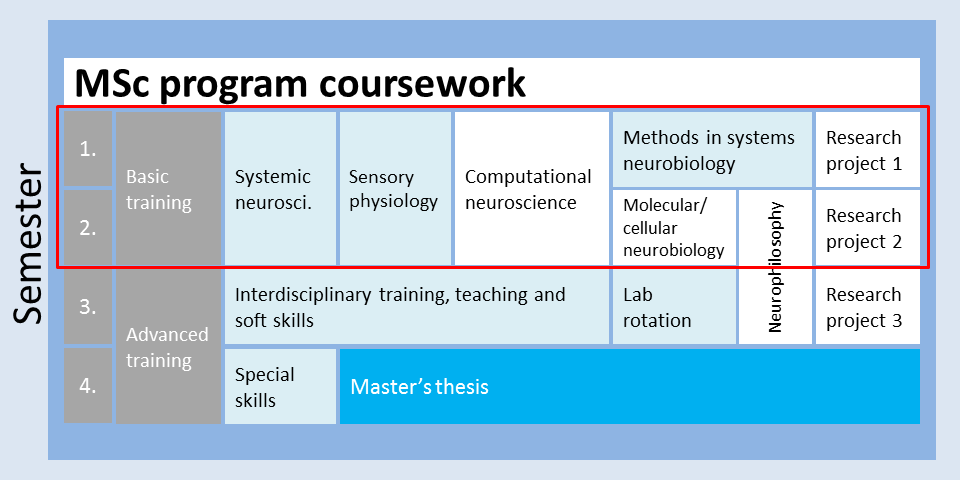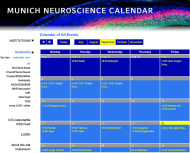Year 1 - Basic training
Schematic overview of the MSc Neurosciences program

The first year of the master's program aims to mediate basic knowledge in the main areas of systemic neurosciences: systemic neurobiology, molecular and cellular neurobiology, sensory physiology, computational neuroscience, and neurophilosophy. Various basic methods are taught in several block courses.
Systems Neurobiology I - Fundamentals in Neurobiology
(see also Systems Neurobiology II)
Covering basic principles in neurobiology, this module consits of a lecture and an associated tutorial. Topics are: electrophysiology, synapses & neuronal networks, motor systems, cognitive neuroscience and neuroethology. nach oben
Sensory Physiology
Sensory physiology is covered in a separate module because it plays a central role in modern neuroscience. This module stretches over two semesters. The first half of this module deals with general sensory physiology, introducing all systems except the auditory system. The second half will deal intensively with audition and communication from the periphery to the cortex.
Winter semester: Invertebrate Vision; Vertebrate Vision; Vestibular System: Magnetoreception; Chemoreceptions; Somatosensory System; Pain and Temperature
Summer semester: Physics of Sound; Sound, Outer Ear, Middle Ear; Cochlea and Auditory Nerve; Auditory Brainstem; Binaural Hearing; Auditory Midbrain; Auditory Thalamus; Auditory Cortex; Psychophysics. nach oben
Computational Neurosciences
This module requires basic knowledge in mathematical skills like calculus and Matlab programming. Prior to each term a preperatory course will be offered to freshen up basic prerequisites. Each part consists of a lecture plus excercise classes.
Modelling Physiological Processes (Winter semester): Passive membrane, Nernst potential, Hodgin-Huxley model, models of dendrites/cable equations, cellular oscillations/phase resettings
Statistical Models and Data Analysis (Summer semester): Basics of probability theory, covariance matrix, principal component analysis, Bayesian inference, information theory, independent component analysis. nach oben
Methods in Neuroscience
In order to give students some hands-on practice in basic neuroscience methods from the very start, students will attend four subsequent practical courses. Towards the end of the first term, students are to chose an elective methods course based on their own interests. Methods courses are: comparative neuroanatomy, neuroanatomy and neurohistology, neurophysiology, psychophysics, elective methods course (e.g. patch-clamp, in-vivo electrophysiology, signal analysis, behavioural experiments, fMRI and PET, diagnostics in neurology, EEG). nach oben
Research Projects
This module requires individual practical work within a project of ongoing research for about 6-8 weeks. The student chooses from a wide variety of projects within the framework of the GSN faculty or external institutions. Our curriculum requires a total of 3 research projects before starting a master's thesis project. Research projects give students a great opportunity to check out different research labs and fields of neuroscience before deciding upon an area of study for their master thesis. nach oben
Systems Neurobiology II - From Development to Higher Neural Functions
(see also Systems Neurobiology I - Fundamentals in Neurobiology)
This module is considered the continuation of Module 1, Fundamentals in Neurobiology. In lectures and associated tutorials, students learn the fundamental principles of development and higher brain functions.
Topics: Neuroanatomy & Evolution of the Nervous System; Neurogenesis, Regeneration & Stem Cells; Hormones & the Nervous System; Cognitive Neuroscience, Attention; Clinical Neuroscience. nach oben
Molecular and Cellular Neurobiology
Even if the focus of our program is systemic neuroscience, it is necessary to have a good understanding of molecular and cellular foundations. This module consits of a lecture, seminar, and 3 week lab course.
Topics: axon guidance, neurotrophins and receptors, neural polarity, neural regeneration, dendrite differentiation, neurotransmitterns and receptors, synapse formation, synaptic plasticity, molecular basis of behaviour. nach oben
Neurophilosophy
(see also year 2)
Since most of our students have a background in natural sciences, general principles in philosophy will be taught in an introductory lecture. The second half of this course occurs in year 2.
Topics: Methodology; Philosophy of Science; Reason and Cause; Neuroethics; Mind/Body; Freedom
An additional special topic seminar is part of this module. Possible topics are: Freedom of Will; Foundations of Judgement; Philosophy of Emotions.





